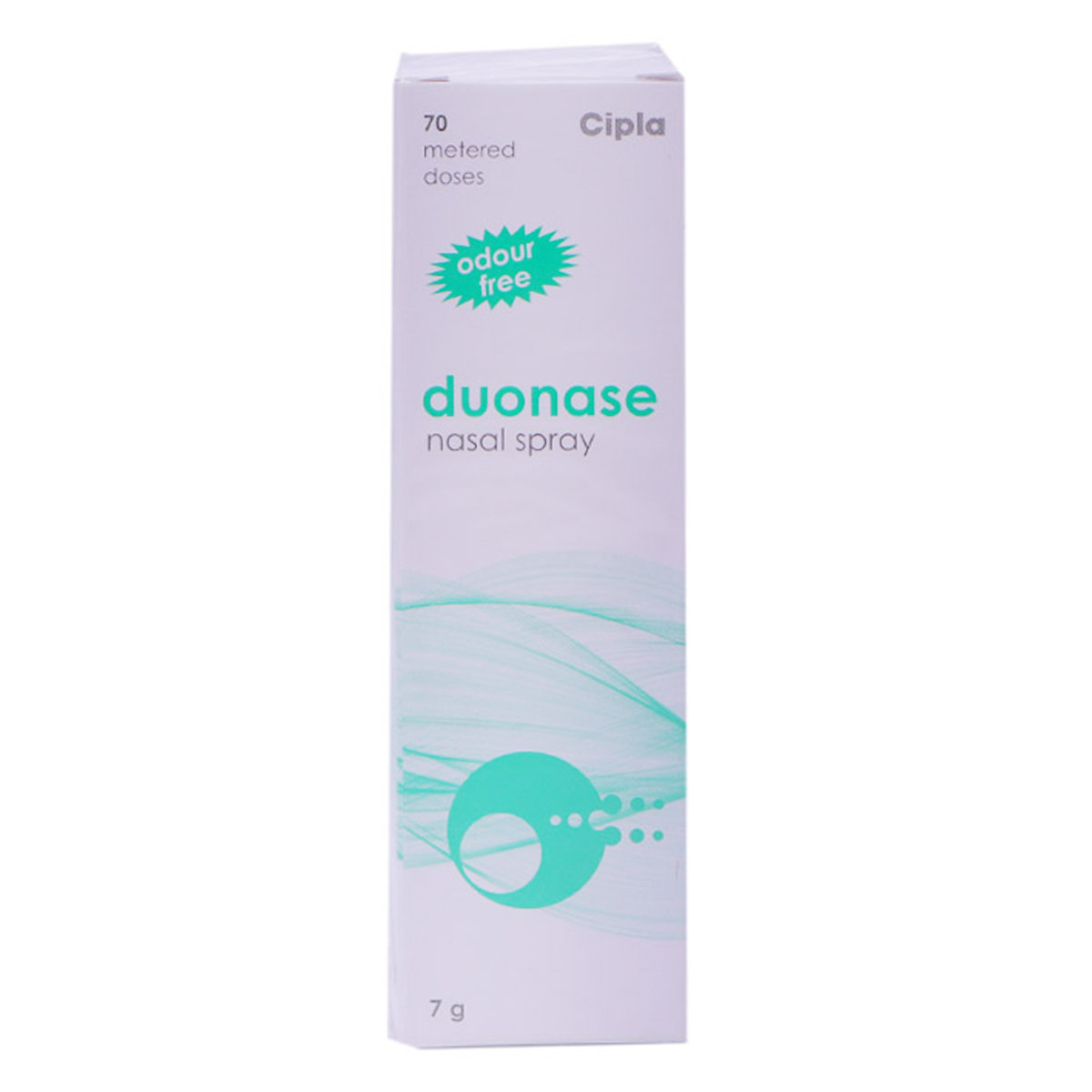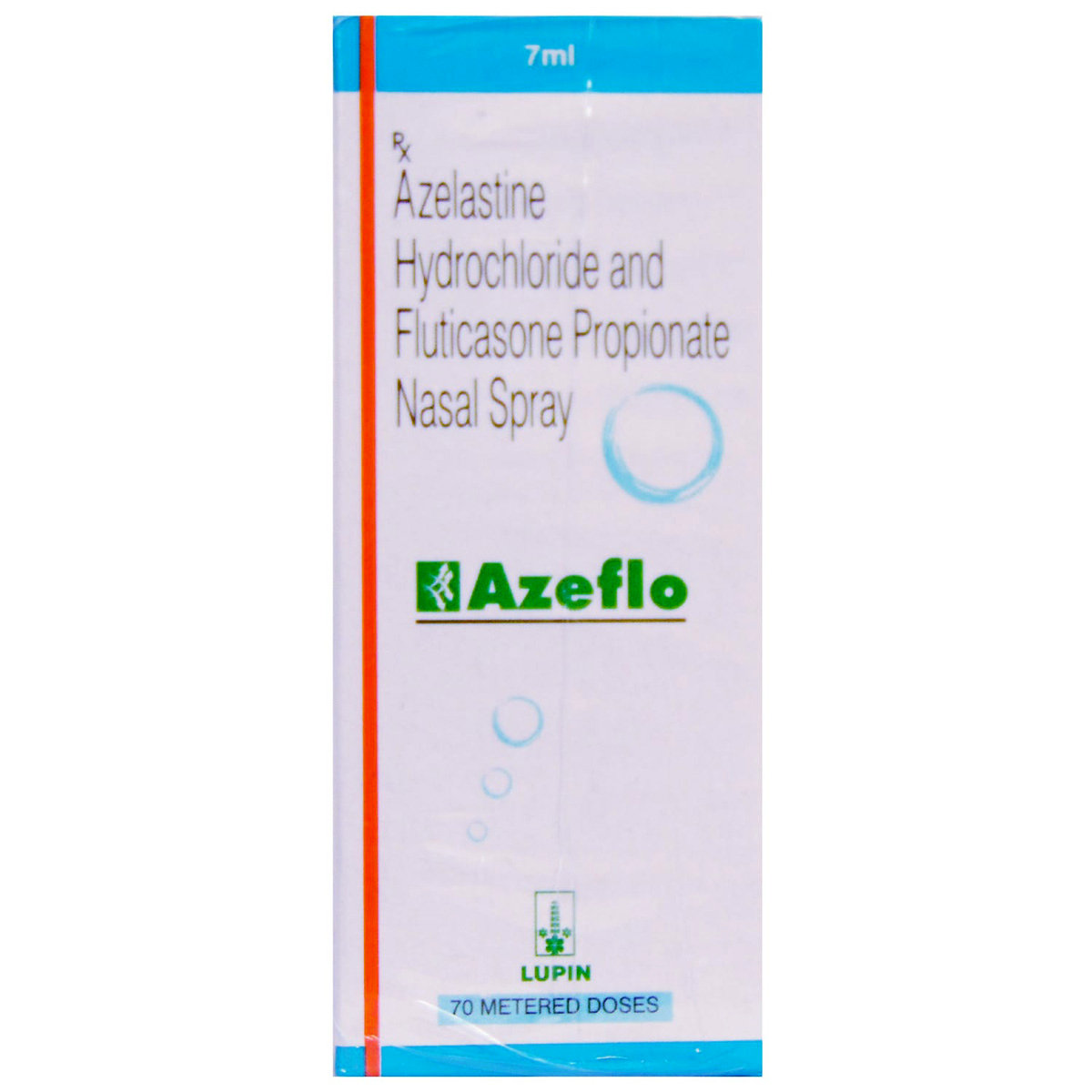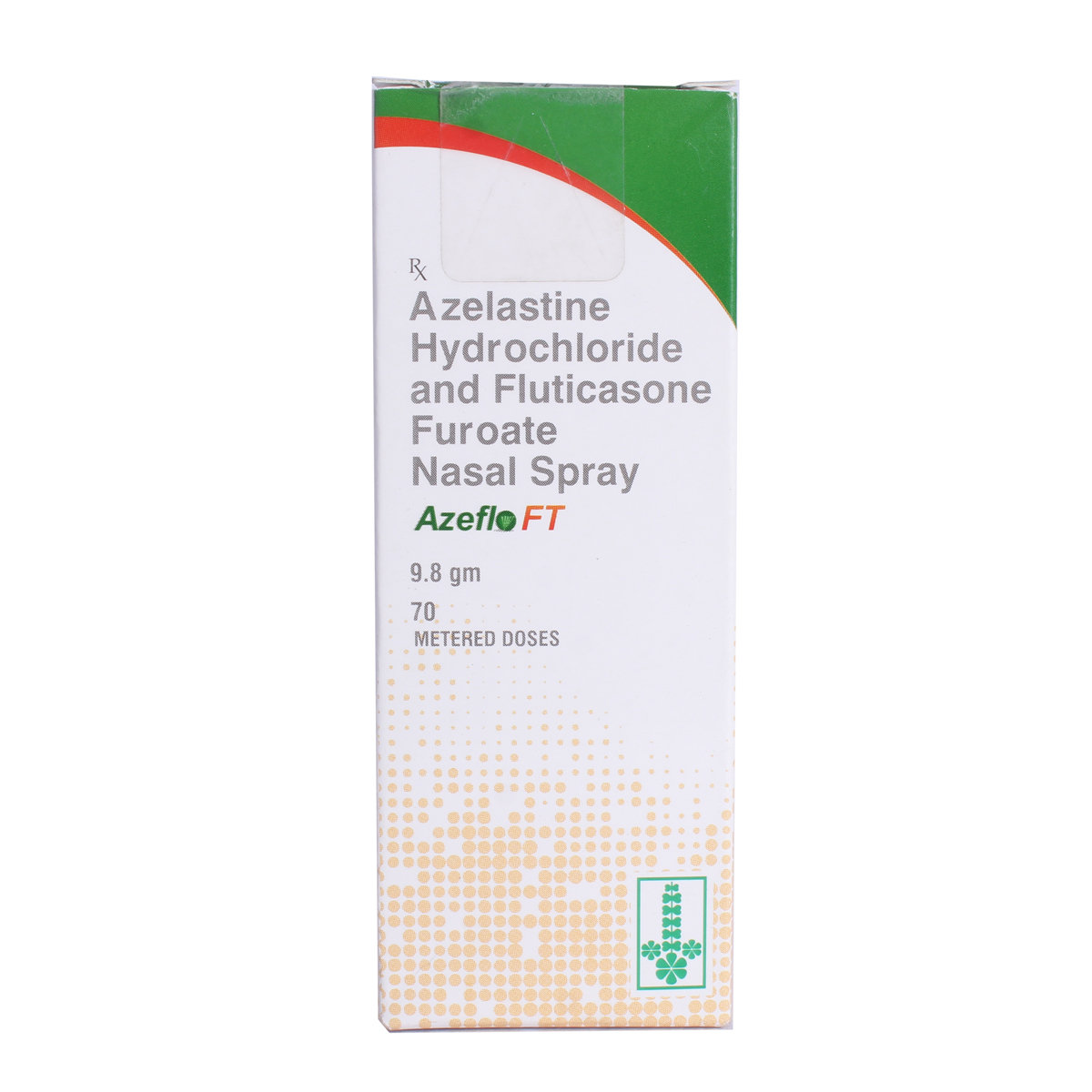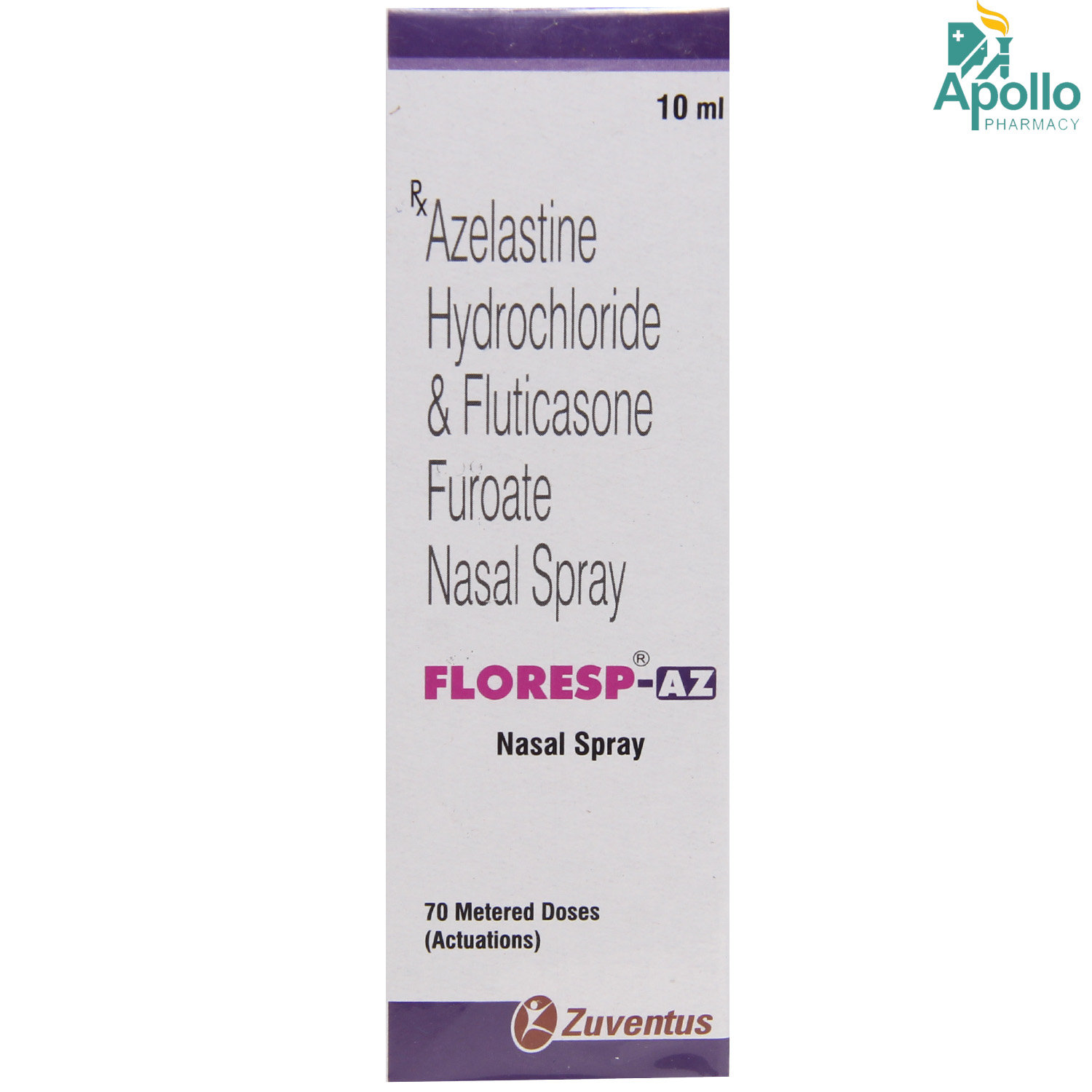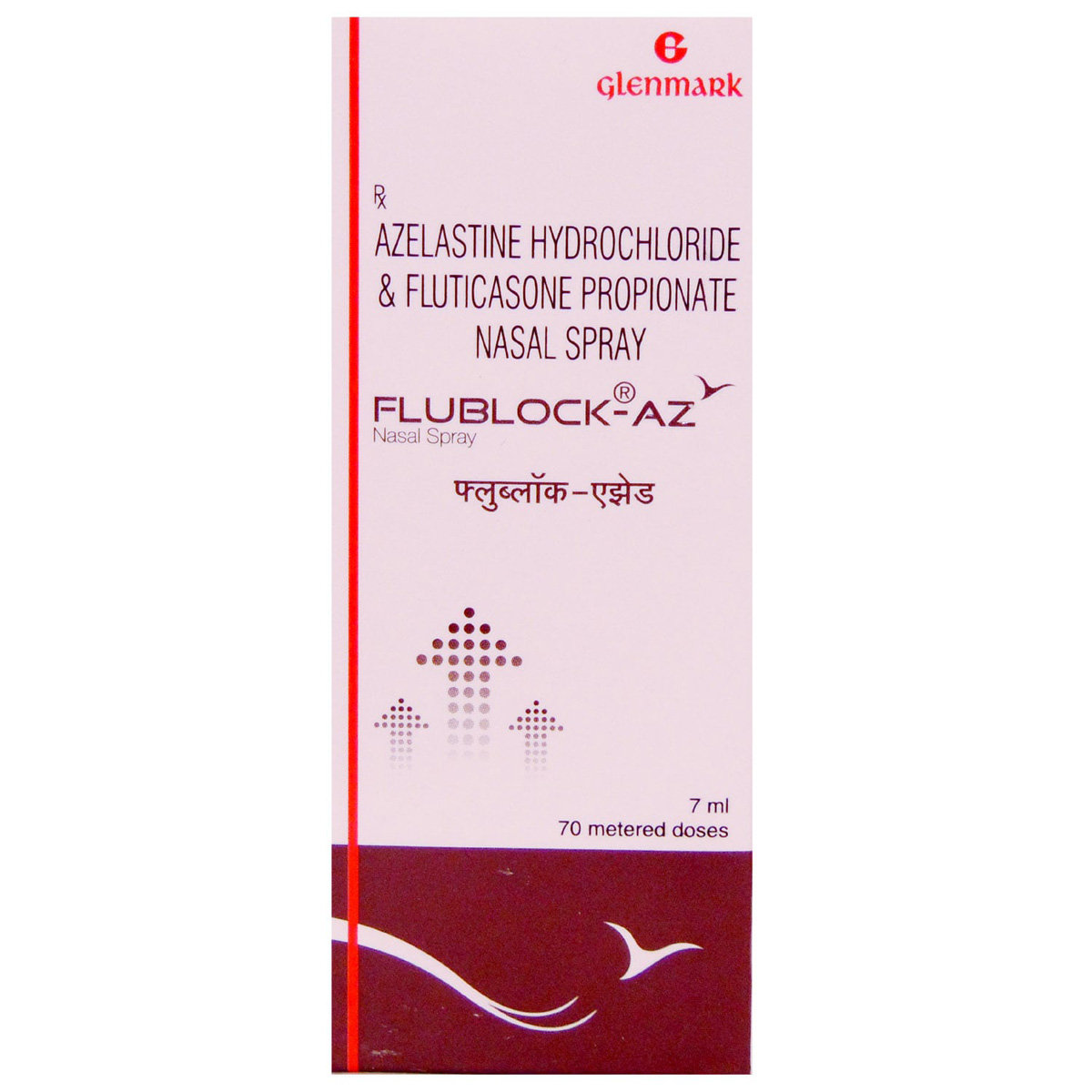Fluticasone+azelastine
About Fluticasone+azelastine
Azelastine+fluticasone belongs to the class of medications called 'antiallergic' primarily used to treat allergic symptoms like sneezing, runny nose, congestion, stuffy nose or watery eyes. An allergy is a condition that occurs when the immune system reacts to a foreign substance. These foreign substances are known as 'allergens.' Allergic condition varies from person to person. Some might be allergic to certain foods and seasonal allergies like hay fever, pollen or pet dander. One of the main symptoms of allergy is cough, which acts as a reflex action in the throat when there is any mucus or foreign irritant entering the respiratory system.
Azelastine+fluticasone is a combination of two drugs: Fluticasone (corticosteroid) and Azelastine (antihistamine/antiallergic). Fluticasone belongs to the class of corticosteroids that works by acting inside the nasal lining cells and stopping the release of certain chemicals in the body that cause inflammatory reactions, thereby relieving sneezing, runny or blocked nose, and sinus discomfort. On the other hand, Azelastine belongs to the class of antihistamines (antiallergic drugs) that works by blocking histamine, a substance responsible for causing allergic reactions. It helps relieve allergy symptoms such as sneezing, running nose, watery eyes, itching, swelling, congestion, or stiffness. Together, both of them effectively treat allergic symptoms.
Take Azelastine+fluticasone as advised by your doctor by spraying towards the sides of nostrils. Your doctor will recommend how often you take Azelastine+fluticasone based on your medical condition. Some people may experience headaches, taste changes or nose bleeds. Most of these side effects of Azelastine+fluticasone do not require medical attention and gradually resolve over time. However, if the side effects persist or worsen, please consult your doctor.
Inform your doctor if you are allergic to Azelastine+fluticasone or any other medicines, are pregnant or breastfeeding before using Azelastine+fluticasone. Azelastine+fluticasone is not recommended for children below six years of age. If you experience vision changes, tiredness, nausea, vomiting, light-headedness, chills, fever, body pains, sores, redness or white patches in the mouth or throat, runny nose, severe nosebleeds, or increased drowsiness, stop taking Azelastine+fluticasone and consult a doctor immediately. Avoid contact with people who have infections or are sick as the Azelastine+fluticasone may weaken the immune system causing infections easily. If you have chickenpox, measles, tuberculosis, surgery or injury on the nose, glaucoma, cataracts, herpes infection of eyes, ulcers, or sores inside the nose, inform your doctor before taking Azelastine+fluticasone.
Uses of Fluticasone+azelastine
Medicinal Benefits
Azelastine+fluticasone is primarily used to treat allergic symptoms like sneezing, runny nose, congestion, stuffy nose or watery eyes. It combines two drugs: Fluticasone (corticosteroid) and Azelastine (antihistamine/antiallergic). Fluticasone belongs to the class of corticosteroids that works by acting inside the nasal lining cells and stopping the release of certain chemicals in the body that cause inflammatory reactions, thereby relieving sneezing, runny or blocked nose and sinus discomfort. On the other hand, Azelastine belongs to the antihistamines class (antiallergic drugs) that works by blocking histamine, a substance responsible for causing allergic reactions. It helps relieve allergy symptoms such as sneezing, running nose, watery eyes, itching, swelling, congestion or stiffness. Together, both of them effectively treat allergic symptoms.
Directions for Use
Storage
Side Effects of Fluticasone+azelastine
- Drowsiness
- Headaches
- Taste changes
- Nose bleeds
Drug Warnings
Please inform your doctor if you are allergic to Azelastine+fluticasone or any other medicines. Do not use the Azelastine+fluticasone if you are pregnant or breastfeeding without consulting the doctor. Azelastine+fluticasone is not recommended for children below six years of age. If you experience vision changes, tiredness, nausea, vomiting, light-headedness, chills, fever, body pains, sores, redness or white patches in the mouth or throat, runny nose, severe nosebleeds, or increased drowsiness, stop taking Azelastine+fluticasone and consult a doctor immediately. Avoid contact with people who have infections or are sick as Azelastine+fluticasone may weaken the immune system causing infections easily. If you have chickenpox, measles, tuberculosis, surgery or injury on the nose, glaucoma, cataracts, herpes infection of eyes, ulcers, or sores inside the nose, inform your doctor before taking Azelastine+fluticasone.
Drug Interactions
Drug-Drug Interactions: Azelastine+fluticasone may interact with antidepressants (duloxetine, escitalopram), anticonvulsants (pregabalin), HIV/AIDS drugs (ritonavir), antifungals (ketoconazole, fluconazole, itraconazole), anti-allergy drugs (cetirizine), cough relievers (such as codeine, hydrocodone), muscle relaxants (such as carisoprodol, cyclobenzaprine).
Drug-Food Interactions: Azelastine+fluticasone may interact with grapefruit juice.
Drug-Disease Interactions: If you have chickenpox, measles, tuberculosis, surgery or injury in the nose, glaucoma, cataracts, herpes infection of eyes, ulcers, or sores inside the nose, inform your doctor before taking the Azelastine+fluticasone.
Drug-Drug Interactions Checker List:
Safety Advice

Alcohol
cautionIt is unknown whether it is safe to consume alcohol with Azelastine+fluticasone. However, as a precautionary measure, it is advisable not to take or limit alcohol.

Pregnancy
cautionThe safety of Azelastine+fluticasone in pregnant women is unknown. Therefore, it is given to pregnant women only if the doctor thinks the benefits outweigh the risks.

Breast Feeding
cautionIt is unknown whether Azelastine+fluticasone is excreted in human milk. It is given to breastfeeding mothers only if the doctor thinks the benefits are greater than the risks.

Driving
cautionAzelastine+fluticasone may cause drowsiness in some people. Therefore, drive only if you are alert after taking Azelastine+fluticasone.

Liver
safe if prescribedInform your doctor before prescribing the Azelastine+fluticasone if you have a history of liver impairment/disorder. Your doctor will prescribe only if the benefits outweigh the risks.

Kidney
safe if prescribedInform your doctor before receiving the Azelastine+fluticasone if you have had a kidney impairment/disorder history. Your doctor will prescribe only if the benefits outweigh the risks.

Children
cautionAzelastine+fluticasone is not recommended for children below six years as the safety and effectiveness were not established.
Habit Forming
Diet & Lifestyle Advise
- Add ginger to foods or tea as it contains some anti-inflammatory compounds that can relax membranes in the airways and reduce cough, irritation and swelling in nasal passages.
- Staying hydrated is vital for those with a cough or cold. Drink liquids at room temperature to get relief from a runny nose, cough and sneezing.
- The immune system is affected by stress and raises the risk of being sick. Do meditation, deep breathing, regular exercise, and try progressive muscle relaxation techniques to get relief from stress.
- It is advised to avoid contact with known allergens (allergy-causing agents) such as pollen, dust, etc. Certain food items are known to cause allergies to you.
- Maintain personal hygiene and keep your surroundings clean.
Patients Concern
Disease/Condition Glossary
Allergy: Allergy is a condition that occurs when the immune system reacts to a foreign substance. These foreign substances are known as ‘allergens’. Allergic condition varies from person to person. Some might be allergic to certain foods and seasonal allergies like hay fever, pollen or pet dander. One of the main symptoms of allergy is cough, which acts as a reflex action in the throat when mucus or foreign irritant enters the respiratory system.
FAQs
Azelastine+fluticasone is a combination of two drugs: Fluticasone (corticosteroid) and Azelastine (antihistamine/antiallergic). Fluticasone belongs to the class of corticosteroids that works by acting inside the nasal lining cells and stopping the release of certain chemicals in the body that cause inflammatory reactions, thereby relieving sneezing, runny or blocked nose and sinus discomfort. On the other hand, Azelastine belongs to the class of antihistamines (antiallergic drugs) that works by blocking histamine, a substance responsible for causing allergic reactions. It helps relieve allergy symptoms such as sneezing, running nose, watery eyes, itching, swelling, congestion, or stiffness. Together, both of them effectively treat allergic symptoms.
You are recommended to avoid taking grapefruit juice with Azelastine+fluticasone as they may lead to adrenal insufficiency and Cushing’s syndrome (increased level of cortisol hormone in the body).
It may take several days of regular use for your rhinitis symptoms to get better. Call your healthcare provider if your symptoms do not improve or get worse.
You are not recommended to take more than the prescribed dose of Azelastine+fluticasone or for a prolonged time as it may cause adverse effects such as changes in body fat (especially in the back, waist, neck, and face), easy bruising, skin thinning, increased facial hair or acne, loss of interest in sex, impotence or menstrual problems. However, if you experience any of these symptoms while taking Azelastine+fluticasone, please consult a doctor immediately.
No, you are recommended not to use Azelastine+fluticasone if you have a recent nose operation or have any nose infections as it may lead to nose bleeding and excessive pain in the nose, leading to further worsening of your condition. Consult your doctor and do as advised for the best results.
No, Azelastine+fluticasone is not used to treat asthma attacks. Azelastine+fluticasone is used to prevent allergic symptoms that can cause asthma. Therefore, it is recommended to carry a rescue inhaler always to treat asthma attacks.
Azelastine+fluticasone contains Fluticasone which belongs to the class of corticosteroids, and it may result in the development of glaucoma and/or cataracts. Therefore, close monitoring is warranted in patients with a change in vision or a history of increased intraocular pressure, glaucoma, and/or cataracts.

